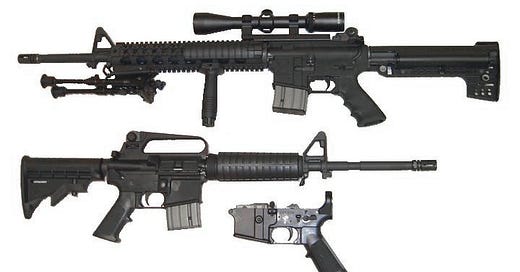‘Show Some Courage!’: White House Repeats Call for Weapons Ban After Ky Shooting
Nation saw fewer gun deaths during 1994-2004 ban, data show
The Biden administration forcefully reiterated its call for reinstatement of an assault-style weapons ban, after yet another mass shooting in the United States left Americans dead.
This time, five people died Monday when an employee opened fire at a bank in Louisville, Ky., and livestreamed the attack on social media, police say.
The victims were aged between 40 and 64. Among nine others injured was a rookie police officer who had graduated to the force just two weeks ago.
This comes just weeks after six people — including three young children — were murdered by a shooter at a private elementary school in Nashville, Tenn.
“Once again, today, the president has called on Republicans in Congress to work together with Democrats to take action to ban assault weapons and high-capacity magazines, to require safe storage of firearms, to require background checks for all gun sales, to eliminate gun manufacturers' immunity from liability,” said White House press secretary Karine Jean-Pierre, the same day as the killings in Louisville. “These are common sense actions we can -- we can ask for and should be getting right now, and it’s what Americans want.
“We know that majority of the American people support this. Instead, we watch Republican official after Republican official after Republican official double down on dangerous bills that make our schools, that makes our places of worship, that makes our communities less safe, while too many Americans are paying with their lives,” said Jean-Pierre. “So, again, we need to act and we need Republicans to show some courage, Republicans in Congress.”
The nation has seen a ban on assault-style weapons before.
Almost three decades ago bipartisan support in Congress helped push through a federal assault weapons ban in 1994, as part of the Violent Crime Control and Law Enforcement Act.
That ban was limited: it covered only certain categories of semi-automatic weapons such as AR-15s and applied to a ban on sales only after the act was signed into law, allowing people to keep hold of weapons purchased before that date. And it also had in it a so-called “sunset provision” that allowed the ban to expire in 2004.
Nonetheless, it appeared to have had a demonstrable effect on gun violence in the United States.
While the ban was in effect, the number of deaths from mass shootings fell, and the increase in the annual number of incidents slowed down. Even including 1999’s Columbine High School massacre — the deadliest mass shooting during the period of the ban — the 1994 to 2004 period saw lower average annual rates of both mass shootings and deaths resulting from such incidents than before the ban’s inception.
The data shows an almost immediate — and steep — rise in mass shooting deaths in the years after the assault weapons ban expired in 2004.
Breaking the data into absolute numbers, between 2004 and 2017 the average number of yearly deaths attributed to mass shootings was 25, compared with 5.3 during the 10-year tenure of the ban and 7.2 in the years leading up to the prohibition on assault weapons.
“So, we need Congress to act. And if you think about the assault weapons ban, we know when we saw when the president was involved in 1994 to get that done, we saw gun violence go down,” Jean-Pierre said, referring to President Biden's work to enact the ban during his time as a Democratic senator from Delaware. “And when it sunset 10 years later, it went back up. So we know what could work and that’s why you continue to hear the president calling on Congress to take action.”
Please support our work…
Also, please subscribe…





